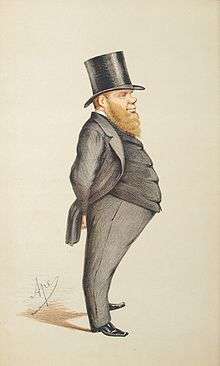Richard Dowse
| Richard Dowse PC | |
|---|---|
 Caricature by Ape published in Vanity Fair in 1871. | |
| Member of the United Kingdom Parliament for Londonderry City | |
|
In office 1868–1872 | |
| Preceded by | Lord Claud Hamilton |
| Succeeded by | Charles Edward Lewis |
Richard Dowse PC (1824 – 14 March 1890) was an Irish politician, barrister and judge, reputed to be the wittiest orator of his time.
Background
He was born in Dungannon, County Tyrone, eldest son of William Dowse and Maria Donaldson.[1] He was educated at the Royal School Dungannon and the University of Dublin, entered Lincoln's Inn in 1849 and was called to the Irish Bar in 1852. After practicing for some years on the North-West Circuit, he became Queen's Counsel in 1863 and Third Serjeant in 1867.[2]
Later career
He was elected as Member of Parliament (MP) for Londonderry City at the 1868 general election. He was appointed a Baron of the Court of Exchequer (Ireland) in 1872, having served as Attorney-General and Solicitor-General for Ireland [3] Dowse resided at 38 Mountjoy Square in Dublin's north city centre.
He died suddenly while holding the assizes in Tralee, County Kerry in March 1890.[4]
Family
On 29 December 1852, he married Catherine, daughter of George Moore of Clones. She died in 1874.[5]
Reputation
He was considered one of the finest and wittiest Parliamentary speakers of the age,[6] and had the ability to crush an opposing speaker. When John Thomas Ball, a future Lord Chancellor of Ireland, asked for the date of a certain event, Dowse replied gravely that he did not have the precise date, but thought it was about the time when Ball changed his political allegiance in the hope of getting into the House of Commons.[7]
By comparison with his political speeches, his judgements are generally considered dull, and have little value as precedents. He never had much reputation as a lawyer, although he had the virtues of common sense, clarity and simplicity. Delaney refers to a complex habeas corpus application which Dowse disposed of by saying simply "I'm afraid the prisoner must remain in gaol',[4] and he occasionally showed a touch of his celebrated wit in his judgements.
Maurice Healy tells the story of a later judge who refused to follow a judgement of Dowse, saying unkindly that "the learned Baron was always better known for his wit than his law". Counsel then embarrassed the judge by pointing out that the House of Lords had given a similar judgement.[8]
Legacy
His obituary notice in The Times of 15 March 1890, read
| “ | Mr. Baron Dowse was a self-made man, who, without social advantages, forced his way by his own merit to the eminent position which he occupied.... He gave at all times free and vivid utterance to his thoughts, without waiting to examine critically the terms in which he should mould them. These were often quaint and graphic, with a dash of wit and humour, which, if a little wanting in dignity, ... gave emphasis and force to an argument or comment.[9][10] | ” |
On his retirement from the House of Commons, Punch magazine published a warm tribute to a man whose humour had been "like an oasis in the desert".[11]
Elrington Ball described him as a man who combined great wit with incisive intelligence and a knowledge of the world.[12]
References
- ↑ Ball, F. Elrington The Judges in Ireland 1221-1921 John Murray London 1926 Vol. 2 p. 369
- ↑ Ball p. 369
- ↑ "States and Regents of the World — Ireland". Archived from the original on 30 July 2009. Retrieved 7 September 2008.
- 1 2 Delaney p.91
- ↑

- ↑ Delaney, V.T.H Christopher Palles Allen Figgis and Co 1960 p.90
- ↑ Delaney p.41
- ↑ Healy, Maurice The Old Munster Circuit Michael Joseph Ltd. 1939 Mercier Press reprint pp.121-2
- ↑ Breathnach, Seamus. "Irish American Murders". Archived from the original on 5 May 2008. Retrieved 7 September 2008.
- ↑ "Archiseek Dublin Tour". Archived from the original on 13 May 2008. Retrieved 7 September 2008.
- ↑ Delaney p.90
- ↑ Ball p.305
External links
- Leigh Rayment's Historical List of MPs – Constituencies beginning with "L" (part 4)
- Irish Criminology
- Archiseek Dublin Tour
- Hansard 1803–2005: contributions in Parliament by Richard Dowse
| Parliament of the United Kingdom | ||
|---|---|---|
| Preceded by Lord Claud Hamilton |
Member of Parliament for Londonderry City 1868 – 1872 |
Succeeded by Charles Edward Lewis |
| Legal offices | ||
| Preceded by Charles Robert Barry |
Solicitor General for Ireland 1870–1872 |
Succeeded by Christopher Palles |
| Attorney General for Ireland 1872 | ||